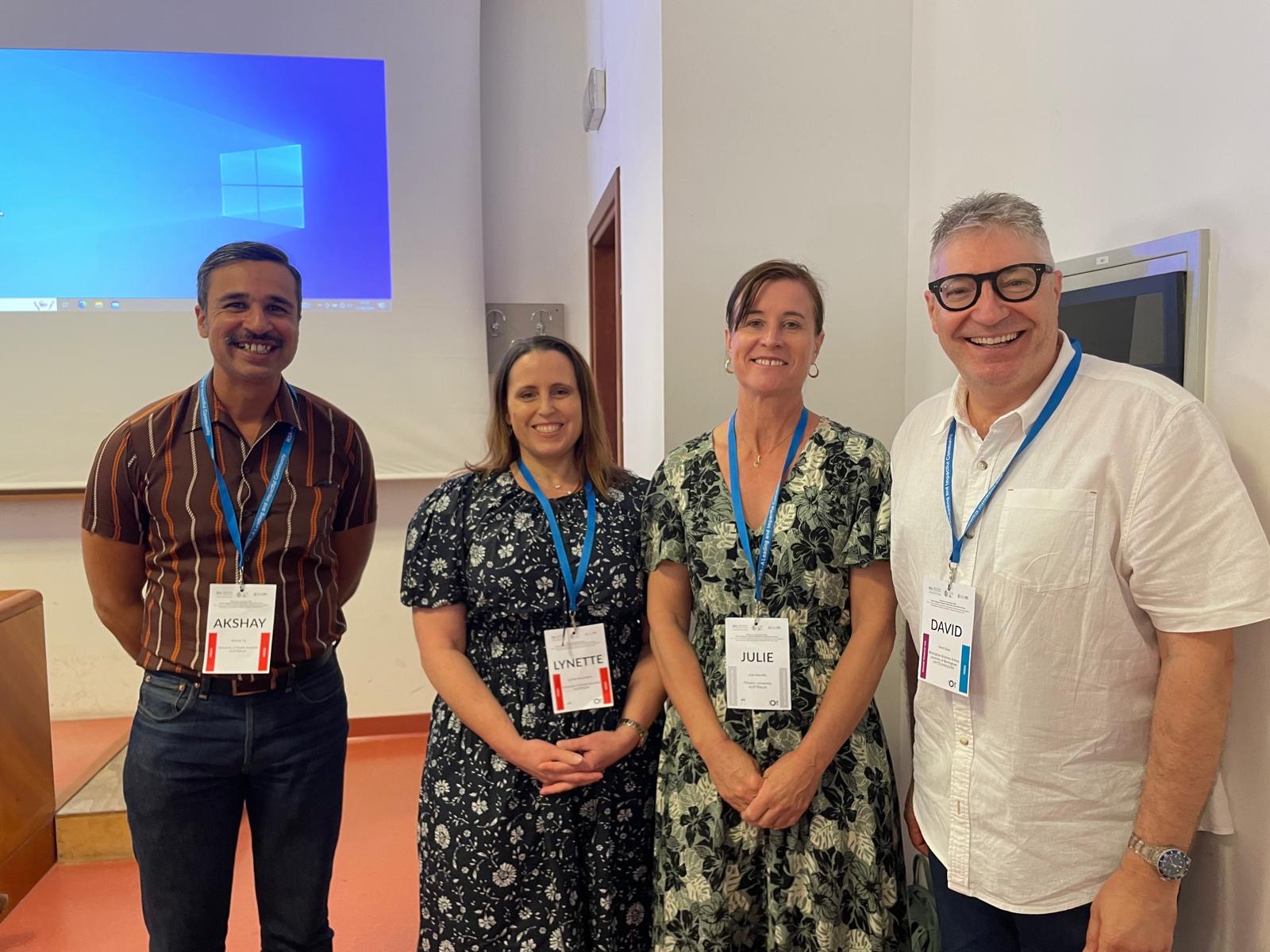The Future Work Future Communities (FWFC) team convened a special session at the Regional Studies Association’s (RSA) Annual Conference held over 11-14 June 2024 at the University of Florence, Italy. Some 750 conference delegates included established experts, early career academics and policymakers, who came together from over 50 different global territories to exchange news, views and research findings from the fields of regional studies and science, regional and economic development, policy and planning in the beautiful city of Florence.
 Project Researchers Akshay Vij, Lynette Washington, Julie Ratcliffe and David Bailey (left to right) at the RSA Special Session
Project Researchers Akshay Vij, Lynette Washington, Julie Ratcliffe and David Bailey (left to right) at the RSA Special Session
The conference featured a specially convened session led by Julie Ratcliffe, FWFC Chief Investigator and Matthew Flinders Professor of Health Economics at Flinders University with contributions from Liliana Fonseca, Research Associate at the University of Strathclyde and David Bailey, FWFC Chief Investigator and Professor of Business Economics at the Birmingham Business School. The session entitled Just Transition: Lessons from Plant Industry Closures for a Rapidly Changing World was packed out and stimulated much debate and discussion.
Julie presented joint work with Ilke Onur, FWFC Chief Investigator and Jia Song from Flinders University, FWFC research team members Jacob Irving and Helen Dinmore from UniSA Business, University of South Australia (UniSA) and Gang Chen from Monash University. Key findings from FWFC’s Wave 1 longitudinal study of workers circumstances, work histories and self-reported health related quality of life were presented. This paper focused on the extent to which unemployment following retrenchment from the automobile industry was negatively associated with mental and physical health. Outcome measures included Short Form 12 (SF-12) mental health and physical health component scores. The cohort consisted of 1277 retrenched auto workers from South Australia and Victoria, including groups who were in paid employment, self-employed, unemployed and fully or semi-retired from employment who were surveyed approximately three years following retrenchment. The unemployed group had the highest prevalence of poor mental health relative to those in paid employment, self-employed and fully or semi-retired. Similarly poor physical health was most prevalent in the unemployed group relative to those in paid employment, self-employed and fully or semi-retired. Current income and employment status were found to be important social determinants of health positively impacting upon the mental and physical health of retrenched workers. It was concluded that interventions to support retrenched auto workers’ transition to gainful employment and increase their financial resources are likely to act as social determinants leading to improvements in mental and physical health.
David presented joint work with David Hearne from the Birmingham Business School and Alex de Ruyter from Birmingham City University which explored union worker perceptions of the potential impact of the transition to low-carbon technologies on a key manufacturing industry (automotive) in two UK regions, in the context of debates over ‘just transitions’. The paper adopts an explanatory mixed-methods approach combining primary survey data with interviews, both collected from automotive employees in two regions (the West Midlands and North East of England). They find striking differences in worker confidence across the two regions driven by a range of factors including inter alia: training and skills; energy security and supply; anchor firm strategy; land availability, costs and planning; shifting comparative advantage; the nature of radical transformation; infrastructure; the supply chain; industrial policy; and the role of place leadership. The regional case studies show that not all regions are equally well placed to take advantage of the opportunities offered by the multiple transitions (green, digital and skills) and the failure to do so poses the risk of further decline and upheaval. The presentation highlighted a raft of policy implications. In particular, skills upgrading was seen as a necessary but not sufficient core mechanism for fostering regional resilience in the face of technical change. Rather, this upgrading needs to be linked to a more holistic and active place-based industrial policy.
UniSA Business Associate Professor Akshay Vij and Research Fellow Dr Lynette Washington also gave presentations about related project findings at the RSA main conference.
For all other activities to-date that have been run as part of the RSA Network on Putting the ‘Just’ into Just Transitions for Cities and Regions, please see below.